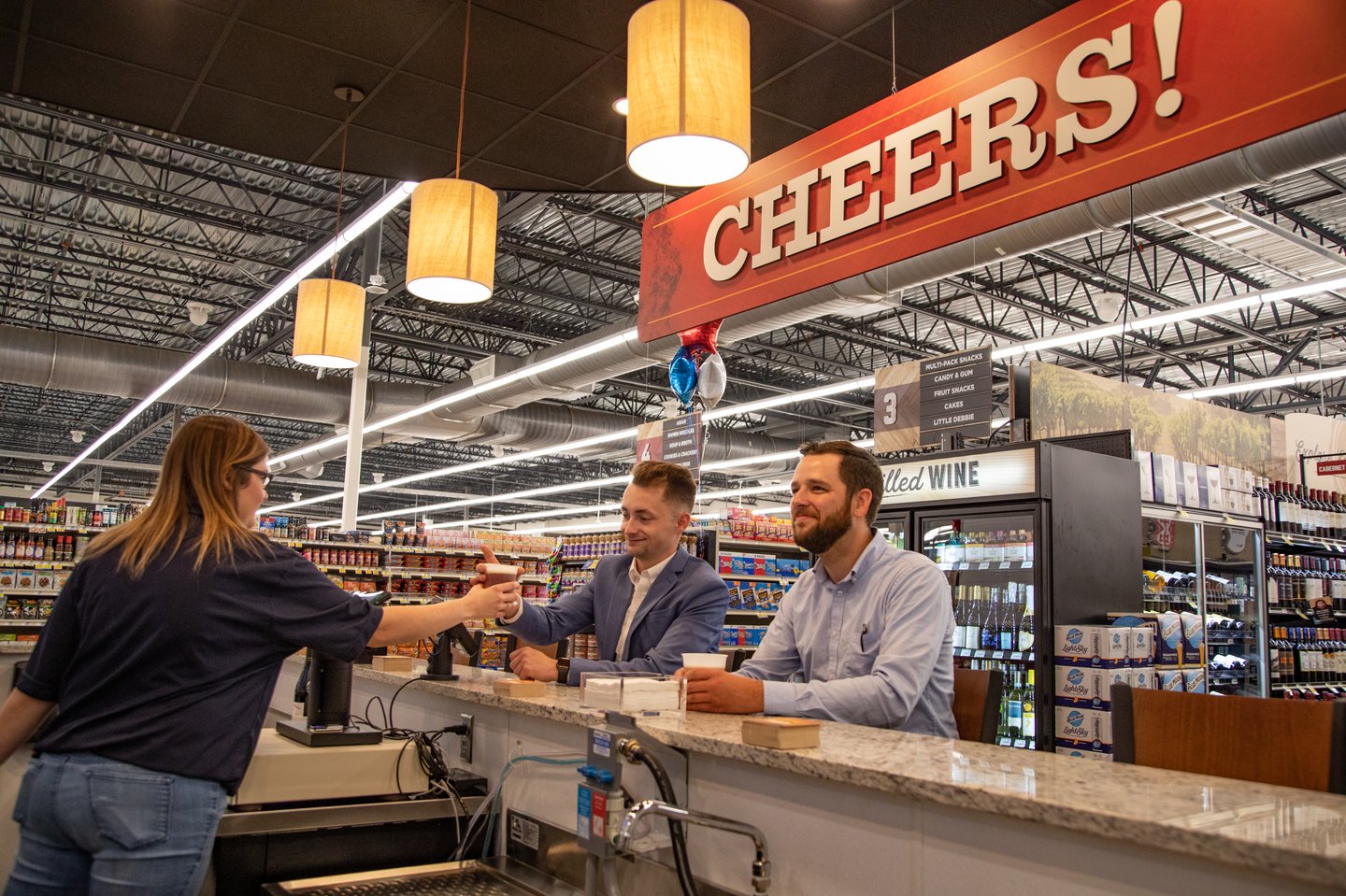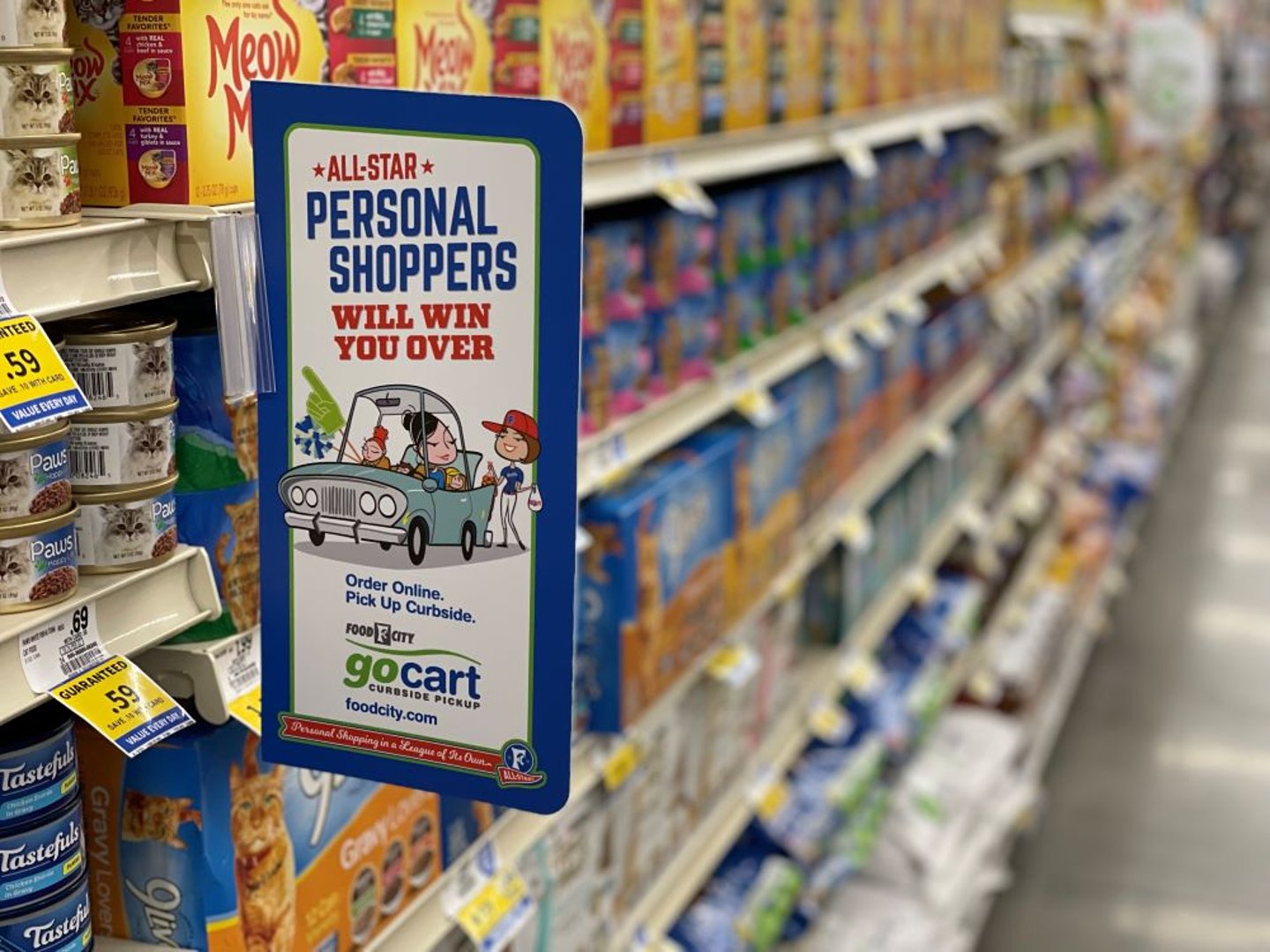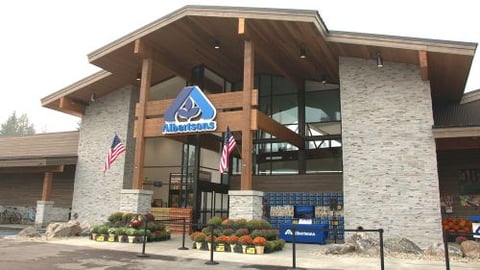Food City: Food, Family and Fun
Residents of Winchester, Tenn., won the equivalent of the food retailing lottery in late June when a 54,000-square-foot Food City store opened on the edge of town.
The store features a bakery and a deli with premium Dietz & Watson meats, a large foodservice operation with a Blodgett pizza oven, a hickory smoker and a hot bar. A 38-seat café with a fireplace is next to the only Starbucks in town, and a floral department is staffed seven days a week with a designer. The full-service meat and seafood departments offer prime beef. There are large grocery and produce departments with gourmet, international and specialty items, and a huge beer and wine section, along with a tasting station with seating. Additional features include a pharmacy, a Gas n’ Go fuel center and a drive-thru pharmacy.
The new location would stand out in any market, but in a community like Winchester, an hour and a half south of Nashville, near the border with Alabama, with a population of roughly 10,000, Food City is living up to the goal of founder Jack Smith to “run the best store in town.” It’s doing so by a wide margin, as the company’s 137th store far surpasses anything offered by the limited competitive set in Franklin County.
“We like county-seat towns, and this is one of our favorite prototypes,” notes Steve Smith, the president and CEO, and son of founder Jack Smith. “We try to size the store appropriately to the market and the competition.”
The extensive product assortment, service offering and attractive design is something that Food City, the operating banner of parent company K-VA-T Food Stores Inc., is looking to replicate elsewhere, according to Smith.
“My goal is to grow our square footage by somewhere between 3% and 5% a year,” he says. “Two things happen when you meet that goal: You can continue to provide good opportunities for people in your company that are looking for growth, and we are able to fund most of our growth through cash flow.”
Growth this year saw the company enter its fifth state with a new store in northern Alabama, not far from the new Winchester location, and another store planned for the company’s home state of Virginia later this year. In addition to store expansion, 20 stores are undergoing décor changes and other upgrades. Next year, Smith says that Food City plans to open six stores — four new locations and two replacements of older stores.
Upgrades such as those seen in Winchester include energy-saving concepts like glass cooler doors, parking lot lights and refrigeration systems, along with motion sensors that control 100% LED lighting and an open-rafter ceiling design.
“We’re a pretty modern company right now,” Smith notes with a characteristic tone of humility.
Humble Beginnings, Bright Future
When Jack Smith was discharged from the U.S. Navy and returned home to Virginia, he needed something to do. He saw an unmet need for the type of food retailing he had experienced while stationed in San Diego ,and bought an 8,800-square-foot Piggly Wiggly store, along with his father, Curtis; cousin Ernest; and uncle Earl. The company grew slowly at first by acquiring other Piggly Wiggly locations until it reached 11 stores total in 1979. That was the year that Steve Smith joined the company.
K-VA-T Food Stores Inc./Food City
Throughout its trading areas, the Food City name is synonymous with NASCAR, as the retailer is a longtime sponsor of two of the sport’s most popular events, the spring Food City 500 and fall Food City 300 at Bristol Motor Speedway, in Bristol, Tenn. In 2017, Food City celebrated the 25th anniversary of its race sponsorships, as well as the 30th anniversary of Food City Race Night. The company is the second-longest-running sponsor in NASCAR history.
“The way we got our Food City name is we bought Quality Food Stores doing business as Food City in 1984,” he recounts. “We went from 11 stores to 30 stores overnight. Then, five years later, we went on to Knoxville, Tenn., and bought the White stores, which totaled a little over 40 stores, and doubled the size of the company.”
He became CEO in 2001 and by 2008, a year after the elder Smith passed away, Food City had opened its 100th location. More steady growth followed, and then, in 2015, Food City experienced another growth spurt when it acquired 29 Bi-Lo locations from Jacksonville, Fla.-based Southeastern Grocers, enabling it to move into northern Georgia.
While Food City has achieved much of its growth through acquisition, when asked if there’s a preferred method of growth for the company, Smith responds: “It depends. If you are going into a town the size of Chattanooga, Tenn., and you need 10 locations, I would rather acquire someone. You get instant scale and people.”
“People” is a word that comes up a lot during a conversation with Smith, because the company’s employee ownership model and value proposition to run the best store in town is dependent on caring associates providing top-flight customer service. Roughly 13% of the nearly $3 billion company is owned by employees, a fact that prompts Smith to share some folksy wisdom.
“No one ever washes a rented car,” he says. “If you own something, you take a little better care of it. You’ve got to have the best people to run the best stores, and you have to give them the tools to do their job.”
Running the Best Stores
Just as Steve Smith assumed leadership from his father, Smith’s daughter Katie Penny is expected to one day become CEO. Such a change isn’t imminent, however. Smith, 64, says, “I love what I do and I feel good,” noting that Penny “ is learning the business just the way I learned the business.”
Penny has an MBA degree, spent six years with Hyatt Hotels after graduation, and recently participated in the National Grocers Association Foundation Executive Leadership Development Program. She currently holds a key human resources role in the store operations team.
“She wants to run the company, and I want to see her run the company,” Smith notes. “And most importantly, my senior leadership team wants to see her run the company, and they are helping her.”
At 31 and with limited experience, Penny isn’t ready for the top job yet if her father were to step down for some reason, but according to Smith, “That’s what Greg Sparks is here for right now.”
Food City’s COO, Sparks has a wealth of retail experience and is about five years younger than Smith. Prior to joining Food City about five years ago, he spent three years as the EVP of operations at Goodlettsville, Tenn.-based Dollar General, and prior to that, spent 34 years at Pleasanton, Calif.-based Safeway in key leadership roles. Smith relishes the fact that Food City is small, nimble and family-owned, which gives it speed, flexibility and a different perspective when making decisions.
“One of the best things about our company is that we are not publicly traded,” Smith asserts. “We always take a long-term view. We are able to do a lot of things that are store- and customer- friendly.”
For example, he cites a piece pick program in which the company will ship a single item to a store if requested by a customer. This is operationally inefficient, to be sure, but a move that contributes to customer loyalty over the long run.
Another example of a service Food City offers that would have been done away with years ago at a publicly held company involves a checkout process called “cashier unload.” As the name implies, Food City cashiers unload shoppers’ purchases before scanning items.
John Jones, EVP and director of store operations, knows the process, currently available in 80% of Food City stores, isn’t efficient, but when asked about removing it, he says, “We’ve been a little hesitant, because we don’t want to be perceived as taking away a service.” Instead, the company is adding self-checkouts and expects to have that option in 40 stores by year end.
Jones, a 41-year Food City veteran, oversees a field operations organization that consists of three divisions, each with three to four districts comprising between 12 and 15 stores. The stores are served by a single 1.2 million-square-foot distribution center near the company’s headquarters in Abingdon, Va., in the western part of the state.
In addition to Jones and Sparks, another of Smith’s top lieutenants is Dan Glei, EVP of merchandising and marketing. He joined the company in 2014 after holding key merchandising, e-commerce and format development roles with Ahold USA and its Giant Food Stores division. Before that he was with A&P, Polaroid, Harris-Teeter and Frito-Lay.
“We have more fun here than any place I’ve ever been,” Glei says. What makes it fun is the freedom that comes with pursuing the “run the best store in town” vision that Smith inherited from his father, Jack. At the company’s new store, in Winchester, those words appear on a large sign with the likeness of Jack at the front end. “We have a simple mission statement, and I doubt we will ever have another,” Glei notes.
As for Smith, he sees the benefit of being a regional operator with a fairly concentrated group of stores — 86 of its 137 stores are in Tennessee — and in having a team of senior leaders with diverse experiences.
“We have a group of people that have come from different backgrounds,” he observes. “We are able to embrace new ideas and try to take the best of those ideas and meld them together.”
Stiff Competition
Being the best at anything can take many forms, but for Food City, its current interpretation of the best in food retailing involves a big emphasis on service, selection, foodservice and competitive prices.
“We want to be close enough to Walmart prices where people are not going to say, ‘Holy cow, I can’t afford that,’” Smith says. “So we are very conscious of Walmart and Kroger’s pricing. We are not going to beat Walmart at what Walmart does, but we are going to be close enough that people will say, ‘I really like this store because I like its perimeter; I love its produce, fresh seafood, foodservice department; and it’s got the best wine and beer selection.’”
Foodservice is easily the most compelling aspect of Food City’s store in Winchester. The expansive department, with large overhead menu boards branded as “Let’s Eat,” is the first thing that shoppers see when they enter the store and move past the Starbucks and the adjacent Jack’s Café.
“Foodservice is huge right now, and it is the biggest changing part of our business,” affirms Jones.
More than 30 stores have hot bars featuring a range of entrées prepared in store, along with 36 varieties of soup that are made from scratch. Foodservice could account for 10% or more of the Winchester stores’ sales, according to Smith.
“We pride ourselves as much as possible on store-made products,” says Glei.
The company also prides itself on a large produce department adjacent to the Let’s Eat foodservice operation. It could account for roughly 13% of sales, according to Smith. Through partnerships with local farmers, some Food City stores receive fresh-from-the-field fruits and vegetables, with many items delivered to stores on the same day they’re picked. Food City buys approximately $5 million in fresh produce from local growers.
In the perimeter, both Smith and Glei are particularly proud of the full-service meat department, which features prime beef and an 18-hour freshness guarantee on grinds. After 18 hours, the product is marked down, and then, if it doesn’t sell, it’s donated.
“We’ve got a great fresh ground beef program I’ll put up against anyone in the industry,” Smith says.
Whether it is fresh ground beef, prepared foods or any of the other elements of Food City’s merchandising strategy, the company’s newest retail concept stacks up well to the best in the industry, even if it’s a little off the beaten path in Winchester.
- Food City’s Philosophy on Brands
National brands are an important element of Food City’s merchandising strategy, but the retailer also employs a unique approach with store brands. As part of the Elk Grove Village, Ill.-based Topco cooperative, Abingdon, Va.-based Food City offers brands that are also sold by other members, but also has its own company-specific brands, in addition to having acquired regional brands that it offers exclusively.
“We are big supporters of Topco, as they are a center of excellence we can draw upon,” says Dan Glei, Food City’s EVP of merchandising and marketing.
Food City store brands are sold under an extensive roster of names such as Food Club, Food City Fresh, Full Circle Market, Wide Awake Coffee Co., Tippy Toes, Harvest Club, Paws Happy Life, Evolve, Over the Top, Nostimo, Crav’n, CharKing, Misty Mountain, Flock’s Finest, b-lieve, Simply Done, TopCare, Culinary Tours, That’s Smart and Pure Harmony.
In addition, Food City has resurrected some regional brands that had gone under in its trading areas and breathed new life into them. Brands such as Kern’s Bread, Kay’s Ice Cream, Lay Meats, Terry’s Snack Foods and Moore’s Potato Chips have become household names once again, thanks to Food City’s backing.
“We have a pretty good variety of regional brands,” Glei notes.
In some categories, Food City may even have four separate store brands, as is the case with pasta and peanut butter, which Glei gestures to while standing in the aisle of the company’s newest store, in Winchester, Tenn.
Why so many? According to Glei, it’s about customer choice. He describes the concept of SKU rationalization employed by some retailers as a strategy for not carrying the products that customers want.













